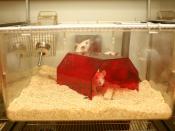Animals should not have to suffer for the sake of testing out new products or medicines. Many of the scientists and government officials agree, animal testing should cause minimal pain and suffering as possible, and that testing on animals should be done only when necessary. Pardue states that, "Replacement of animal tests, reduction in the number of animals used (currently some 20 million annually in the U.S.), and refinement of experimental procedures so as to lesson animal suffering".
Reduction means to receive maximum information from fewer animals.
Replacement means to use alternative methods other than testing on animals.
Refinement means to minimize animal pain and suffering by using alternative methods.
Animal research or otherwise know as animal testing is using non-human animals to do experiments on. Roughly there are 100 million animals used yearly and later destroyed in testing procedures conducted as part of pure research, applied research or toxicology testing most of the time in large schools or pharmaceutical companies.
Testing on animal is also done on farms, army basses and health authorities, on many things from flies and rats to monkeys. Most laboratory animals are purpose bread, while a smaller number are caught in the wild or supplied by local pounds. Animal testing is always being argued concerning the ethical issues and if they are wrong or right using animals. The foundation for Biomedical Research, an American organization "promotes public understanding and support for humane and responsible animal research". According to the U.S. Foundation for Biomedical Research, "animal research has played a vital role in virtually every major medical advance of the last century - for both human and animal health" and "that many major developments that led to Nobel Prizes involved animal research, including the development of penicillin (mice), organ transplant (dogs), and work on poliomyelitis that...


